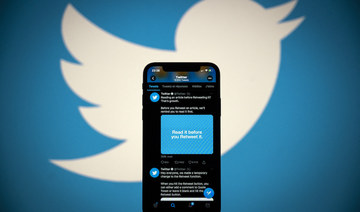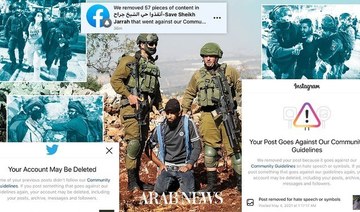DUBAI: After an internal policy leak, Facebook’s parent company Meta announced it would allow posts urging violence against “Russian invaders,” as missiles continued to rain down on Ukraine.
This means that statements like “death to Russian soldiers,” “kill those Russian invaders” or even “may God destroy Russia for the invasion” will not be taken down if reported, and thus highlights another controversial double standard in how media and big tech is dealing with the conflict.
“As a result of the Russian invasion of Ukraine we have temporarily made allowances for forms of political expression that would normally violate our rules, like violent speech such as ‘death to the Russian invaders,’” a Meta spokesperson said of the policy change, while claiming the company “still won’t allow credible calls for violence against Russian civilians.”
Reuters, one of the first news outlets to report on the update, tweeted: “Facebook and Instagram to temporarily allow calls for violence against Russians.”
The news agency said Facebook would also allow praise for the right-wing extremist, neo-Nazi group Azov Battalion, which before the war was prohibited on the platform.
“It’s a business and right now the important thing for business in the Western world is to show support to Ukraine, no matter how. So Facebook’s way to show that support is (by) allowing hate messages toward Russians,” said Ignacio Hutin, journalist and author of “Ukraine: Chronicle from the Frontline” and “Ukraine/Donbass: A renewed Cold War.”
Hutin, who visited the Donbass during the war that tore the region after 2014, added: “I don’t think that’s related to the invasion itself. I don’t even think Facebook cares about the Russian invasion. I think Facebook is a profit-making business. But I just can’t agree with that kind of decision … It just promotes hate.”
While Meta is a private company, its social media platforms must abide by the laws of the countries in which they operate. In fact, just two weeks before the Russian invasion of Ukraine, Meta’s operations in Europe were threatened with closure due to European data regulations that prevented it from transferring, storing and processing Europeans’ data on US-based servers.
Meta’s decision also goes against its own values. When Marne Levine was vice president of global public policy, she said: “Facebook’s responsibility prohibits ‘hate speech.’ While there is no universally accepted definition of hate speech, as a platform we (Facebook) define the term to mean direct and serious attacks on any protected category of people based on their race, ethnicity, national origin, religion, sex, gender, sexual orientation, disability or disease. We work hard to remove hate speech quickly.”
Facebook has often been criticized for allowing hate speech and calls for violence on its platform, and has been described as “the place where calls for violence thrive.” An Associated Press report said it was used to “foment division and incite offline violence” in Myanmar.
Helle Thorning-Schmidt, a member of Meta’s oversight board and former prime minister of Denmark, declined to comment on the issue.
In the past decade, more than five conflicts and wars have broken out across the globe, and Facebook has made headlines for deleting content or promoting violence.
In May last year, as the Palestine-Israel conflict raged on, Facebook had its own battle in the Middle East, for its reputation. During the global focus on the evictions of Palestinians from Sheikh Jarrah district in occupied East Jerusalem, Facebook and Instagram were accused of “silencing pro-Palestinian voices” on the platforms. Some users reported that their posts were taken down for simply bearing the hashtag “#SaveSheikhJarrah.”

Facebook also deleted hundreds of posts condemning the evictions, suspension of accounts and censoring of content on a hashtag that included the name of one of Islam’s holiest mosques. The company acknowledged the accusations and blamed it on a technical fault.
The alleged glitches put the social networking giant under the microscope as not only did it ban posts against invaders in that context but it also silenced many voices from an oppressed, occupied and evicted community.
“Of course it is hypocritical. But it’s just business, it’s not about coherence,” Hutin said.
“It’s like the month of the LGBT pride: companies in some countries change their avatars and include the rainbow flag, but in countries where they know that won’t be well received, they don’t. Is it hypocritical? Sure. But it’s just business.”
Using the social media monitoring tool Talkwalker, it was found that from Feb. 24 to date the words “Russia” and “Russian” had a 44-46 percent negative sentiment on social media. In the same period of last year the figures were 27 percent globally and 8.7 percent in Europe. The phrase “Death to Russians” has been used more than 470 times since Feb. 24, against zero mentions during the same period of last year.
Russians are being blamed for supporting President Vladimir Putin’s war on Ukraine, and the attacks are not just online. Russians in the US have reported being verbally threatened and their businesses being vandalized.
Milana Shevarkova, a 30-year-old Russian national working as a senior client consultant in the US, said on the “saddening recent event of Russia invading Ukraine” that she disagreed with the social network’s policy updates.
“If this is acceptable, then they should allow all content on social media where comments are not regulated, banned or softened.”
A final error with Facebook’s policy update to allow posts calling for violence against Russian soldiers is a logical one. According to Reuters, one of Meta’s emails said the update was applicable only in Armenia, Azerbaijan, Estonia, Georgia, Hungary, Latvia, Lithuania, Poland, Romania, Russia, Slovakia and Ukraine.
But if the policy team at Facebook genuinely believe in their amendments, why are they not allowed globally? And on what basis were these countries selected? They are not all ex-USSR states. They do not all border Russia. They are not all states that have animosity toward Russia. They are not all at war Russia or been invaded by it. The package makes zero sense.
Days before the announcement of the new policy, Nick Clegg, president of global affairs at Meta, issued a statement saying the company had received requests from governments and the EU to take steps in relation to Russian state-controlled media and had responded by restricting access to RT and Sputnik across Europe. So could the policy change to allow posts calling for violence against Russian soldiers be part of what the company was asked to do by EU governments, as further retaliation against Moscow?
























